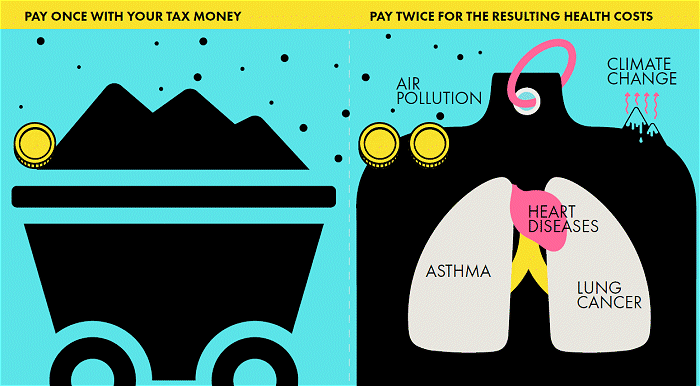A new report says health costs associated with fossil fuel use in G20 countries are more than six times higher than the substantial subsidies the oil, gas and coal sectors receive.
The report from the Health and Environment Alliance notes that leaders of the G20 agreed to put an end to subsidies for fossil fuels eight years ago – but action to date hasn’t really reflected that commitment.
Citizens of G20 nations, which includes Australia, are continuing to suffer a double-whammy – first for the subsidies (USD $444 billion in 2014 states the Alliance), and second through the harm these fuels do to human health. The latter is costing these economies an estimated US $2.758 trillion a year.
One of the countries highlighted in the report is Germany. While Germany is a solar power superstar, more than 40% of its electricity generation was still from coal fired power plants in 2016.
The 5.1 billion Euros spent on fossil fuel subsidies Germany in 2014 would have been sufficient to provide more than 300,000 households with solar panels as well as fund the transition for Germany’s 15,000 coal power plant workers for five years.
Fossil Fuel Subsidies In Australia
Subsidies for renewable energy in Australia, a relatively new development, are often criticised by opponents of renewables. However, the wealthy and very well-established fossil fuel sector in Australia is still also ensconced on the subsidy gravy train. According to the report, Australia’s oil, gas and coal producers enjoyed around $A5.6 billion in subsidies in 2014.
That would buy a lot of solar power systems.
There are 777 deaths attributed to air pollution in Australia each year and the report estimates the health and other costs to our nation from the impacts of fossil fuels to run into many billions of dollars.
As to the cost of adverse health impacts from coal fired power generation in Australia specifically, another report we mentioned a couple of weeks ago estimated it A$2.6 billion annually (2014).
A recent claim that renewable energy will kill due to subsidies may be quite an overreach, but deaths being attributable to fossil fuels is a cold, hard fact – and subsidies are directly related to the death toll.
“It is time to seize the opportunity to improve the health of millions of people worldwide by abandoning subsidies to the deadly fossil fuel industry,” said Genon K. Jensen, HEAL’s Executive Director.
The Alliance has called on G20 countries set a deadline for the phase-out of all fossil fuel subsidies by no later than 2025. Doing so would slash health care costs, reduce premature deaths, free up funds for public health and renewables and avoid adding to the future impact of climate change.


 RSS - Posts
RSS - Posts



Speak Your Mind